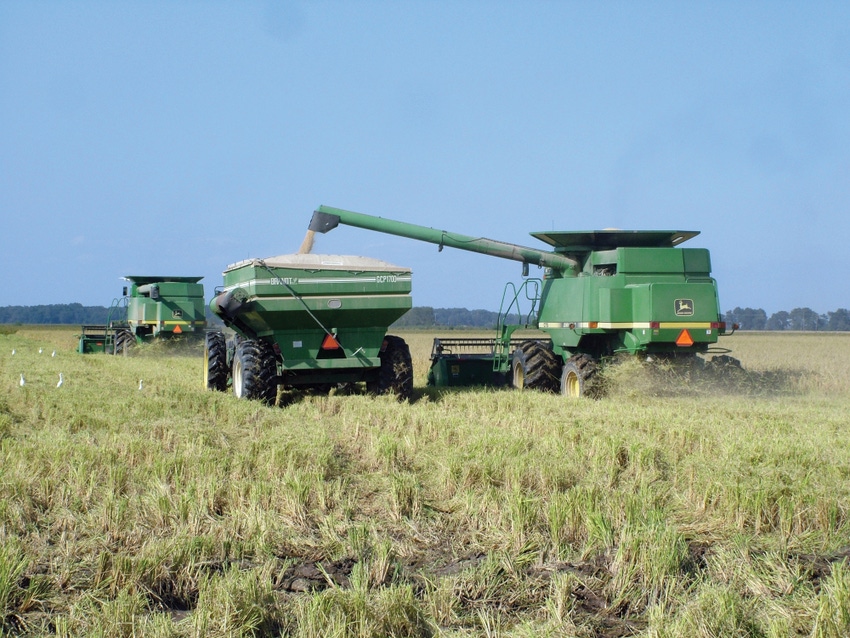September 19, 2013


Mark Isbell
You think you know your own backyard, or your own back 40 for that matter, until you see it from your neighbor’s house. This insight, imparted by a communications coach during day one of session two of the 2013-15 Rice Leadership Development Program, served as the central theme for this session: Learn to see things as others might — from a new angle, with a fresh perspective — to help us understand and communicate about our industry more clearly.
Time spent in the rice growing regions of central Arkansas, at John Deere World Headquarters in Moline, Ill., and on the floor of the Chicago Board of Trade provided our class with an opportunity to see new things and gain a fresh perspective on places with which we were already familiar.
The second session began where I grew up — the rice-growing region of central Arkansas. Although the place was thoroughly familiar to me, I would soon discover there were countless things to be learned there if only I changed my perspective.
On our first day we focused on gaining useful professional skills from etiquette, to public speaking, to media relations. Then at Producers Rice Mill, a massive facility located in Stuttgart, Ark., Keith Glover welcomed us and explained his company’s operation, primarily the parboil plant, where rough rice is cleaned, cooked in the hull, then dried and milled. This process not only greatly increases the milling yield of the rice, but also creates a product that is desirable to many consumers because of its decreased cooking time and fluffy consistency. The parboil facility plays an important role in providing a robust marketplace for each of Producer’s 2,500 farmer members.
Check Rough Rice Futures Prices
Another component of their operation, the use of rice hulls to provide heat for drying rice and steam for cooking it, provided a valuable lesson in efficiency.
Our next stop was the University of Arkansas Rice Research and Extension Center, a 1,000+ acre research facility in the heart of the Grand Prairie that began operation in 1927. Dr. Chuck Wilson led our tour and provided an overview of the current research on everything from how to mitigate panicle blight, to more efficient water management, to variety and hybrid development.
Among the most enjoyable experiences of any session in the Rice Leadership Class is the alumni dinner. Our class enjoyed a great meal provided by Five Oaks Catering while getting to know former class members and others who work in the rice industry, learning that the rice industry is a deeply interconnected group of characters who all play a part in the story of U.S. rice. Our interdependency is strength, and it is not enough to be the best at what you do in your part of the industry; you also should seek to make the whole industry stronger, for the benefit of all.
The next morning found the class at Riceland Foods headquarters, where Danny Kennedy, Carl Brothers, and Bill Reed discussed the origin of Riceland Foods and shared how Riceland serves its 6,000 members with mills and facilities across the Mid-South. They also discussed current government policy and their work to maintain a robust market for our commodity by engaging those in Washington.
Betsy Ward: U.S. rice farmers value international markets
Our next stop was over 600 miles away, at John Deere Company world headquarters in Moline, Ill., a place that is very different from central Arkansas, but still very much a part of the rice industry. Joe Townsell Jr. of John Deere Co. gave us a tour of John Deere Harvester Works, where over 2,700 people and numerous robots work in over 70 acres of enclosed space to manufacture combines. They begin the manufacturing process with sheet metal, bolts, nuts, and the biggest vat of John Deere Green paint I have ever seen, and 10 days later they have produced a shiny new combine capable of harvesting thousands of bushels per day. The scale and efficiency of the operation is remarkable, and the attention to detail and quality is obvious. But more impressive still are the people of John Deere who embrace a corporate culture that values customer input and seeks to provide the highest degree of customer satisfaction.
The last stop of this session was the Chicago Board of Trade, located in the heart of Chicago, far from the dusty fields of home. Fred Seamon, senior director of commodity research and product development with the Chicago Mercantile Exchange Group, took us down to the trading floor and showed us where rice is represented by futures contracts — pieces of paper and numbers on screens that are traded between buyers and sellers. This helps the entire industry with price discovery by providing a means for farmers and buyers to hedge against adverse market moves. Though the whole system seems chaotic, with buyers and sellers flashing hand gestures and calling out bids and offers, it is actually a very efficient system with a remarkable degree of transparency.
Ag news delivered to you: Subscribe to Delta Farm Press Daily.
It is very easy to become focused on your own back yard, your own back 40, and forget to look at the industry as a whole. In all the places we visited during session two of the Rice Leadership Program, we were reminded of just how integrated and interdependent the rice industry is, and how many different people, institutions, and companies rely on one another. Looking at different aspects of the industry from the vantage point of others provided a richer understanding of what our industry is made of.
And from all those different vantage points, I liked what I saw. From the fields of home, to the research stations, co-ops, equipment manufacturers and market makers, the U.S. rice industry is comprised of world-class individuals doing their part to maintain viability and meet the challenges of the future.
Mark Isbell is part of a multi-generation rice farm in central Arkansas focused on zero-grade farming and rice behind rice rotation. He is married and a father of two. He holds a B.A. in Professional and Technical Writing and Speech Communication as well as an M.A. in Writing from the University of Arkansas at Little Rock, where he teaches part-time.
Follow Mark Isbell on Twitter: @mjisbell.
You May Also Like




